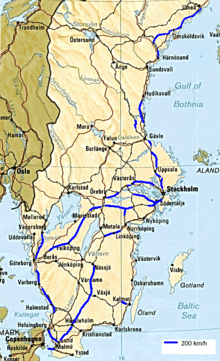High-speed rail in Sweden

In Sweden many trains run at 200 km/h. Train types which currently attain this speed include the X2 tilting trains for long distances, the Regina widebody trains, the X40 double-decker regional trains, and the Arlanda Airport Express X3. Since both the X2 and X3 are allowed to run at 205 km/h in case of delay, they can technically be considered as high-speed trains. The X2 runs between many cities in Sweden including Stockholm, Gothenburg, and Malmö. The Arlanda Express trains connect Stockholm and Stockholm-Arlanda Airport.
Plans for upgrades to 250 km/h
Hundreds of kilometers of track are ready for 250 km/h operation, with the exception of signaling systems, catenary, and the trains themselves. A modified Regina test train, called "the Green Train", has attained a maximum speed of 303 km/h,[1] with regular service at 250 km/h planned.
There are plans for a 180 km section of the Stockholm-Malmö line to be upgraded to allow for speeds of 250 km/h. These plans have been delayed until further notice because a decision must be made regarding whether to build a new parallel super-high-speed railway or not. Other railways that will eventually allow 250 km/h speeds (today 200 km/h) are long sections of Stockholm–Gothenburg, Gothenburg–Malmö, and Trollhättan–Gothenburg. A new Kramfors–Umeå line, Botniabanan[2] has been ready for 250 km/h non-tilting trains since 2010, but train operators have not yet revealed plans for 250 km/h trains on Botniabanan, or on any other 250 km/h capable line. All these will be mixed passenger/freight railways.
The Swedish signalling system ATC does not currently allow for higher speeds than 200 km/h, and current plans allow for higher speeds only with a future EU-system called ERTMS. Botniabanan has had this system in operation since 2010, allowing 250 km/h. ERTMS will be introduced on certain other railways around 2015, possibly enabling more than 200 km/h on them. (The ATC does in theory allow 250 km/h but that would require reinstalling most track equipment and signals since ATC uses point based transmission, and higher speed means new points of transmission. ATC is installed for 250 km/h along 16 km east of Södertälje but no trains are approved for that[3]).
SJ have bought new trains (type X55, delivered 2010) that are prepared for 250 km/h but limited to 200 km/h until a later date. SJ has revealed plans to order new 250 km/h trains in approximately 2013, with delivery around 2015.
Ongoing plans for true high-speed
There are plans for long completely new high-speed railways Stockholm–Linköping–Jönköping–Borås–Gothenburg ("Götalandsbanan") and Jönköping–Helsingborg–Copenhagen ("Europabanan" for the Swedish part), since the existing railways are relatively congested, with mixed 200 km/h passenger trains, slower regional trains and even slower cargo trains. The plans say that the new railways would be built similar to the French TGV-lines with long curve radii and relatively steep inclines allowing for speeds between 300–320 km/h with non-tilting trains, dedicated for high-speed passenger trains.[4]
The traffic administration (Trafikverket) has started detailed planning and is in the process of deciding the best route between Gothenburg–Borås and Linköping–Södertälje (Ostlänken), however no specific dates have been determined for the start of construction on these lines. An informal proposal by the Banverket is for operation by the year 2025. There is political and (primarily) regional pressure to build these railways as soon as possible. Cost estimates are about 10 bn SEK for Gothenburg-Borås and 24 bn SEK for Linköping-Södertälje.
Long term plans not clear at present
The Borås–Linköping line will be built some years later than the first parts of Götalandsbanan. It has less potential for regional rail (still around 400,000 people live near this part of Götalandsbanan), but is of course needed for long-distance trains. Between Södertälje and Stockholm the existing railway with 250 km/h potential will be used. A southern extension to these lines, through Jönköping–Helsingborg–Copenhagen is considered economically unfeasible for the time being. Danish politicians are not very enthusiastic either. The existing line through Linköping–Malmö–Copenhagen is however planned to be upgraded to 250 km/h.
Cost estimates are roughly 30 billion SEK for Borås–Linköping and 30 billion SEK for Jönköping–Helsingborg. The cost of the Helsingborg–Copenhagen line with a tunnel is hard to estimate, but 30 billion SEK is possible here too.
Travel times
These are realistic travel times based on future plans and investigations.
| Göteborg-Stockholm C | Malmö-Stockholm C | Copenhagen-Stockholm C | Kastrup-Arlanda | |
|---|---|---|---|---|
| Trains, year 2009 | 3:05 | 4:25 | 5:15 | 5:45 |
| With improvements on present railways according to plans until 2020. City Tunnel–10 min faster. 250 km/h–15 min faster to Malmö and to Göteborg. More tracks, higher capacity–10 min | 2:40 | 4:00 | 4:40 | 5:10 |
| Ostlänken and Götalandsbanan built Stockholm-Nässjö 45 min faster [5] | 2:15 | 3:15 | 3:55 | 4:25 |
| Europabanan built | 2:15 | 2:40 | 2:40 | 3:30 |
| Air, year 2009 incl. checkin | 2:30 | 2:30 | 2:45 | 1:40 |
References
- ↑ — Berlin Transportation (2008-09-15). "Gröna Tåget Pushes the Swedish Speed Record to New Heights in Very High Speed, Reaching 303 km/h". Bombardier.com. Retrieved 2011-09-24.
- ↑ Startsida - Botniabanan
- ↑ LINJEBOK KATRINEHOLM C STOCKHOLM C (page 14)
- ↑ "Dokument för projekt Götalandsbanan". Trafikverket.se. 2011-07-04. Retrieved 2011-09-24.
- ↑ sv:Ostlänken